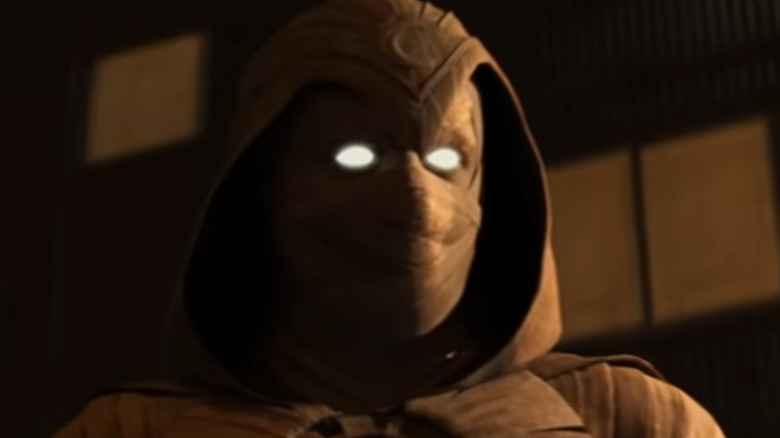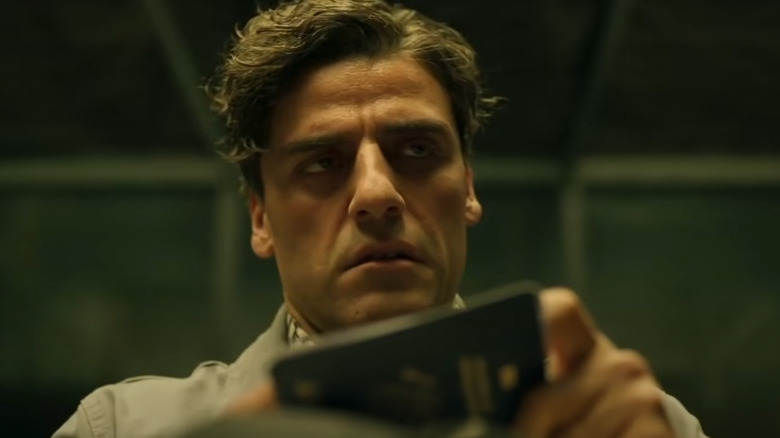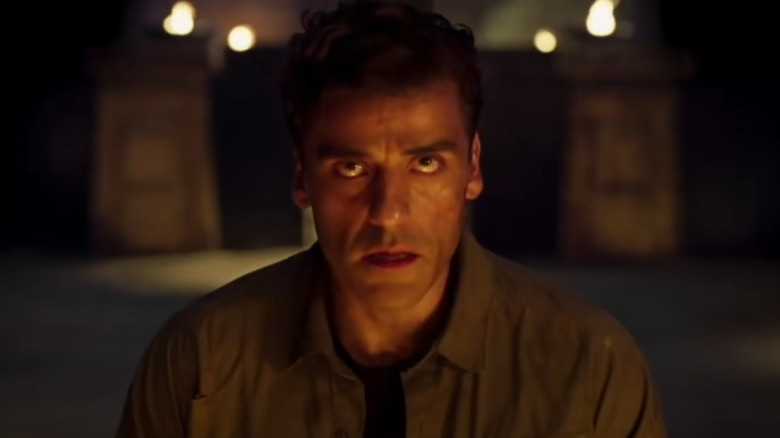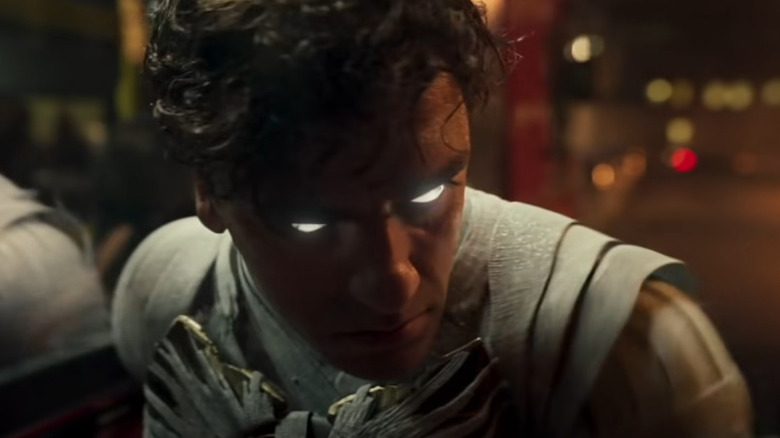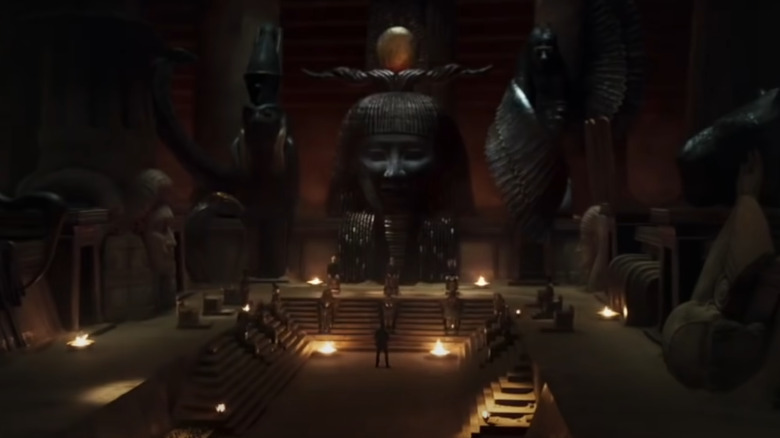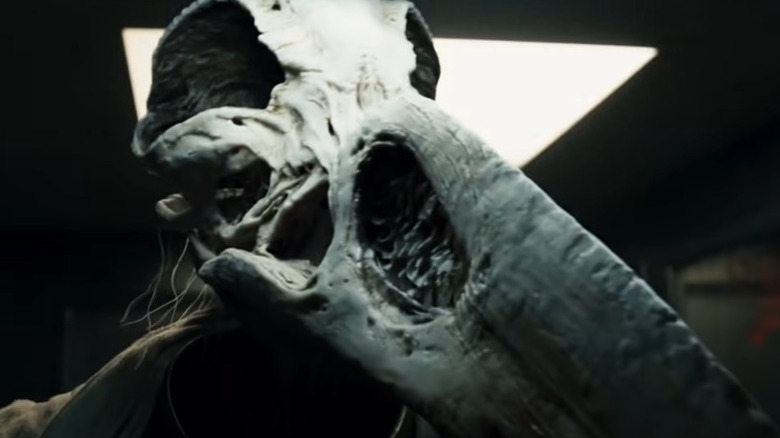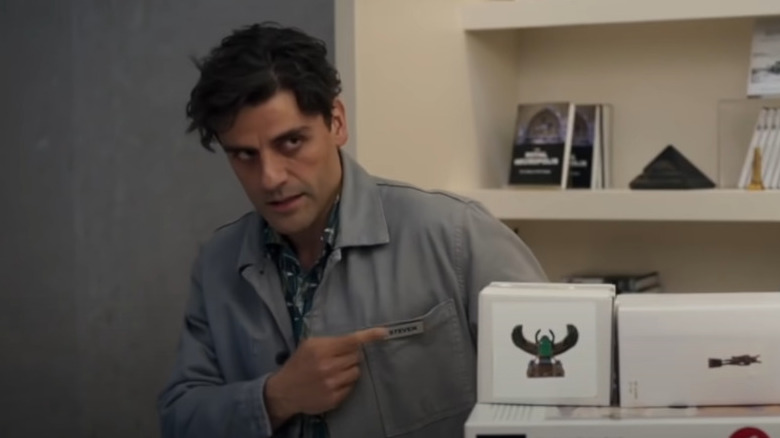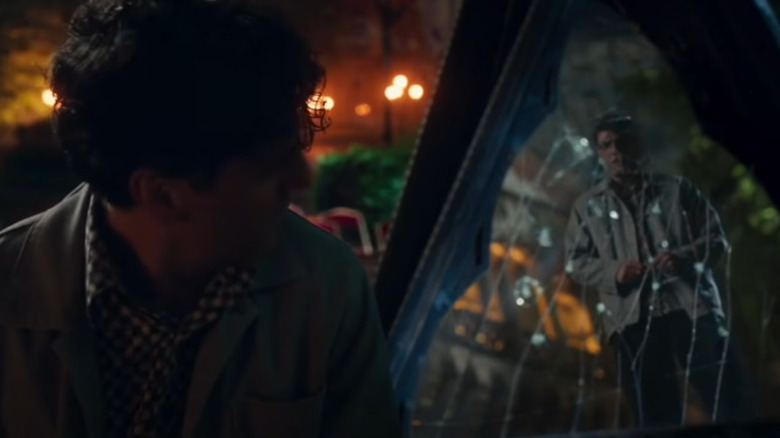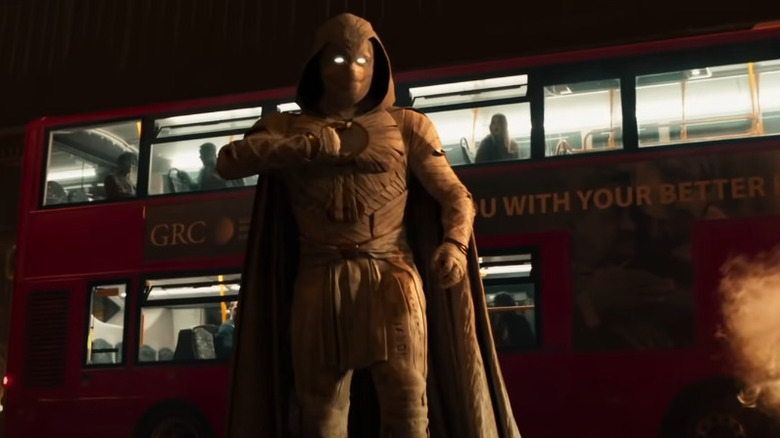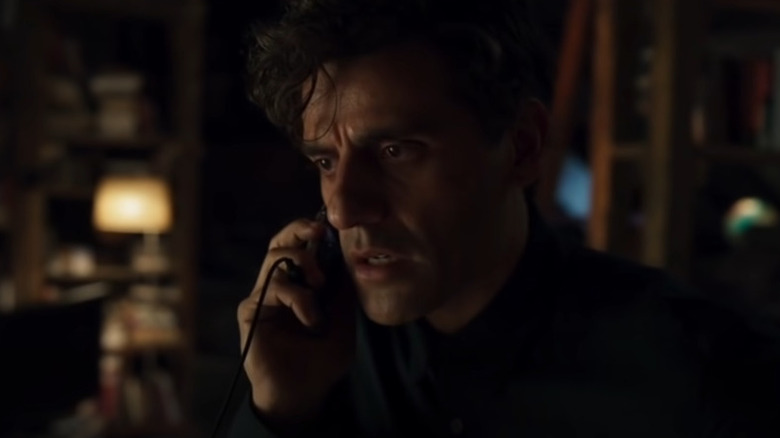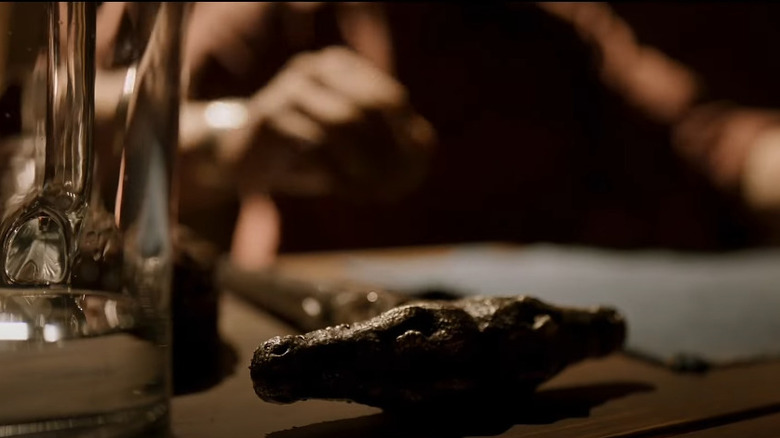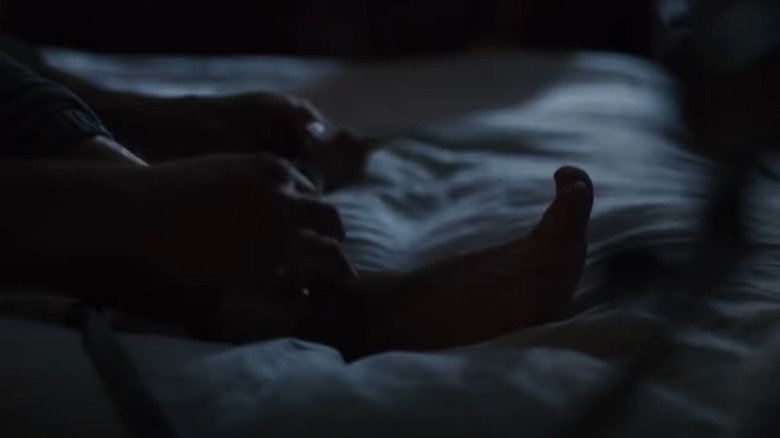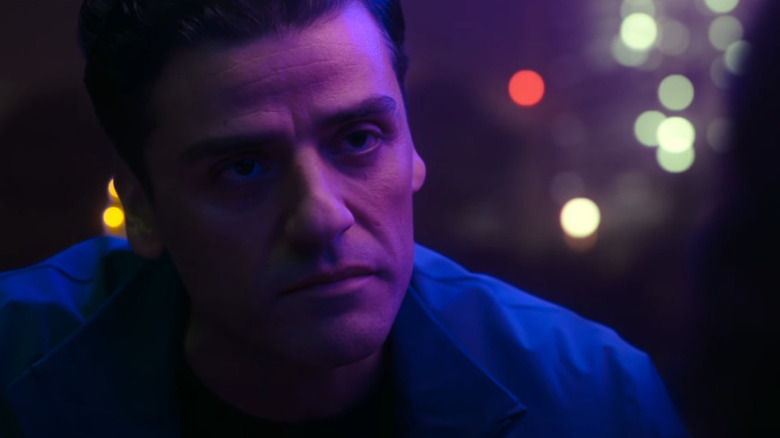The Best And Worst Things About Moon Knight
Disney+ has released the last episode of the first season of "Moon Knight," a series set in the Marvel Cinematic Universe that has been praised for bringing something new and different to the ever-expanding franchise. In its early review of the season, TVLine called "Moon Knight" the "most original Marvel series" among the Disney+ stable and commended it for being the "most visually exciting." Meanwhile, Variety described the show as "a refreshing change of course" for the multibillion-dollar comic book and entertainment giant.
The eponymous superhero lead of "Moon Knight" treads new ground in the MCU, as he will be the first protagonist to lean heavily into ancient Egyptian mythology and tackle the sensitive subject of mental illness. Featuring Oscar Isaac in the titular role (and bringing the duality of mercenary Marc Spector and museum gift shop employee Steven Grant to life), the series further enhances the already colorful tapestry of the MCU mythos. Hopefully, the series will plant the seeds for future productions to explore supernatural themes and characters.
Now that the first season has concluded, it's a good time to look back at the aspects of "Moon Knight" that worked, as well as the ones that didn't. If you haven't seen the entirety of "Moon Knight" Season 1 yet, here's your spoiler warning.
Best: A legitimate breath of fresh air
Whether we'd like to admit it or not, the various films and TV shows set in the MCU have generally played it safe, sticking to the tried and tested Marvel formula and keeping the audience invested primarily for the over-arching narrative. "Moon Knight" breaks the mold as a Marvel show that doesn't quite feel like a Marvel show — and we mean that in the best way possible.
First, it features locations that haven't been heavily explored in previous MCU productions. From the bustling streets of London to the sprawling sands of the deserts surrounding Cairo, the environments depicted in "Moon Knight" are a welcome departure from the typical American locales seen in numerous MCU films. Additionally, the series embraces the hero's supernatural horror roots (Moon Knight first appeared in 1975's "Werewolf by Night" vol.1 #32 as an antagonist for the titular character). Even though it doesn't quite lean into those themes that heavily — this is still a production from a studio that isn't known for taking risks — the tonal shift still serves as a welcome infusion of freshness in a franchise that has been running for well over a decade.
Worst: Plot holes and contrivances
While "Moon Knight" attempts to tell a new story in a different way, it doesn't always stick the landing, especially in terms of telling a coherent narrative. In its attempts to move the plot forward, "Moon Knight" makes certain choices that, quite frankly, don't make a lot of sense.
For example, it seems ridiculous that Spector and Khonshu (F. Murray Abraham) have so much difficulty keeping the golden scarab — a compass that points to the ancient Egyptian goddess Ammit's tomb — away from his former avatar, Arthur Harrow (Ethan Hawke). For all of the tricks and powers up Moon Knight's sleeve, it's baffling that they couldn't devise a better plan to prevent Harrow from finding Ammit's final resting place. In another scene, Khonshu messes with the sky to force the council of Egyptian gods (the Ennead) to gather so that he and Spector could get the chance to expose Harrow's scheme and stop him in his tracks. They then completely blow this opportunity, largely because Khonshu decides to accuse Harrow in an overdramatic manner instead of calmly and clearly explaining what has happened so far to the gods.
This, in turn, allows Harrow to turn the tables on Khonshu and Spector, highlighting the former's ill-temperedness and the latter's complicated mental state. These kinds of storytelling decisions make you wonder if Marvel is simply trying to tell a three-episode story in six.
Best: Not so connected to the MCU
Among all the live-action Disney+ Marvel shows that have already premiered, "Moon Knight" is the first one that isn't headlined or co-headlined by an existing MCU character. "WandaVision," "The Falcon and the Winter Soldier," "Loki," and "Hawkeye" all showed brand-new adventures of beloved MCU protagonists following the events of "Avengers: Endgame." However, getting the full "Moon Knight" experience doesn't require anyone to watch all the MCU movies and TV shows in advance. In fact, it's just as newbie-friendly as the first "Iron Man" film from way back in 2008, when the Marvel Cinematic Universe wasn't even a "Cinematic Universe" yet.
Perhaps most importantly, anyone who follows "Moon Knight" from start to finish becomes invested solely in the fate of Marc Spector, his alter ego Steven Grant, and the supporting cast. Largely absent are the expectations that come with the interconnected franchise and the itching questions about how the show's events will have a deeper impact on the rest of the MCU. It's obligation-free viewing, a standalone story that you can thoroughly enjoy without having to put any amount of time into the other MCU shows and movies.
Additionally, the fact that "Moon Knight" introduces audiences to a brand new character with zero continuity baggage creates the impression that anything can happen in its episodes. This makes "Moon Knight" more unpredictable — and thus, considerably more exciting to watch than shows that you know have to tie things up in a neat little bow.
Worst: Indifferent gods, again
Stop us if you've heard this one: A race of ancient, incredibly powerful beings swears not to interfere in mortal affairs, choosing to stay hidden and silent instead of taking an active role in defending Earth and humanity against otherworldly threats. Yes, it's a plot point we've already seen in MCU productions — hello, the Watcher from "What If?" and Eternals of "The Eternals."
The Ennead make it clear that they decided to take a step back and become spectators across the ages because humanity turned its collective back on them. However, it's worth considering that all of these shows take place in a reality where a purple-skinned, power-mad alien has made it his life's goal to collect space gems and eliminate half of all life in the universe with a snap of his fingers. With stakes that high, this plot device becomes less of a bitter pill to accept and more of a sign of ill-contrived storytelling. After all, suspension of disbelief can only take you so far.
Best: F. Murray Abraham as Khonshu
Without a doubt, one of the highlights of "Moon Knight" is F. Murray Abraham's over-the-top portrayal of the Egyptian moon god, Khonshu. As the source of Marc Spector/Steven Grant's powers and the one who saved Spector from certain death, Khonshu acts as the hero's spiritual guide, entrusting him with the task of stopping Harrow from unleashing Ammit's brand of preemptive justice upon the modern world.
Listening to Khonshu hurling insults at Steven or barking ridiculously violent instructions at Marc is an absolute joy, with Abraham's powerful, booming voice further highlighting the hilarious absurdity of this all-powerful deity's petulant behavior. In fact, the prospect of Moon Knight appearing in other MCU productions becomes even more enticing when you consider the potential of witnessing how his petty patron reacts to other characters. Seriously, can you think of anything better than watching a freakishly tall figure with a raven's skull for a head mocking the Avengers?
Worst: Keeping Steven in the driver's seat
"Moon Knight" makes a bold narrative choice by opening the series from the perspective of the mild-mannered, socially awkward Steven Grant instead of the confident, competent Marc Spector. This decision pays off in spades, as the mystery of the protagonist's multiple personalities unfolds over the course of the episode, saving the full reveal of Moon Knight himself for the episode's final moments. This also allows for multiple opportunities to generate laughs in awkward situations, with Steven waking up at various points in the episode surrounded by absolute chaos and with no recollection of how things escalated in the first place.
However, after the existence of Spector is revealed, the scenes that feature Steven suddenly feel like both a bore and a chore. For an action-packed TV show such as "Moon Knight" to work properly, it needs an active protagonist, not a passive one. We wish "Moon Knight" would have shifted the focus on Marc from the second episode onward, thus giving us a lead character who actually does things instead of waiting for something to happen to him. Instead, the show still opts to give us plenty of scenes with Steven, whose personality is mainly timid and reactive, in the driver's seat.
Best: Oscar Isaac's performance
From the looks of it, it's already hard enough to play one superhero character. Now, imagine having to play two wildly different personalities — or possibly more — inhabiting the same body.
Saying that Oscar Isaac killed it in his portrayal of Steven Grant and Marc Spector is an understatement. Even though we've already had a glimpse of what he can do in a superhero role thanks to his turn as Spider-Man 2099 in Sony's "Spider-Man: Into the Spider-Verse," Isaac's starring role in "Moon Knight" offers the audience a more in-depth look at his acting range. That range is highlighted during scenes where one of his personalities faces a reflective surface and communicates with the other. Sure, it's not a terribly original way of depicting multiple personalities on the silver screen — just ask Willem Dafoe from the Sam Raimi "Spider-Man" trilogy. Still, it can't be denied that Isaac does an excellent job of making Steven and Marc convincingly different from one another. The actor goes all in to create contrast for their clashing personalities, even pulling off Steven's deliberately terrible British accent, which is, amusingly, being spoken by an American who is unaware that he's an American.
As a bonus, we even get to see Isaac channeling the hilariously overdramatic flair of F. Murray Abraham's Khonshu during the failed trial of Harrow. If this doesn't make fans completely disregard his disappointing turn as the titular villain in the lackluster "X-Men: Apocalypse," we don't know what will.
Worst: Lackluster fight choreography and wonky CGI
It's not surprising that a show like "Moon Knight" would have a considerably lower budget than, say, "Avengers: Infinity War" or "Captain Marvel." After all, aside from the fact that it's a production for the small screen, Moon Knight isn't a character you'd associate with colorful energy blasts or extraterrestrial environments. However, the gaps in "Moon Knight"'s budget become painfully clear in certain areas, especially when said areas are fight scenes that involve complicated choreography or CGI.
While the fight choreography in "Moon Knight" isn't bad per se, it can be awkward, flat, and dull at times. As Decider put it in the site's recap of Episode 3, "the fight choreography is a mixed bag, especially for a series that sold itself on being sort of a return to the grim and gritty combat of the old Marvel/Netflix shows [...] full of sound and fury, but weightless in the end."
Meanwhile, it seems like "Moon Knight" could use a lot more work and focus in the CGI department. Things like the physics of Moon Knight's cape and the truck chase in episode one seem just a tad off — not terrible enough to completely trash the series, but never quite right enough to convince the audience to become fully immersed in the show's reality. In fact, right after the series debuted on Disney+, fans took to Twitter to tear it a new one for its subpar CGI (via Meaww).
Best: Most of the violence is left to the imagination
Even though the action scenes and special effects in "Moon Knight" aren't exactly what you could consider top tier, Marvel Studios deserves some credit for the interesting approach the production team has taken when handling fight scenes.
Early on in the series, it becomes clear that wherever Marc Spector goes, carnage follows — even though viewers rarely ever get to fully see it happening. Instead, the audience is typically treated to the aftermath of the fight scenes (usually whenever Steven successfully regains control after blacking out at critical moments), leaving much of the actual violence off-screen and in the viewer's imagination.
While one can argue that this is simply a clever move on the production team's part in terms of conserving the budget for fight scenes, this kind of storytelling also strengthens the overall narrative of "Moon Knight." After all, there are few things that can surpass the terror and brutality of the scenarios we make up in our heads — and seeing the trail of bodies in the wake of Steven's alternate personality also leaves plenty of gaps for our minds to fill.
Worst: Rehashing a plot point from a (great) MCU movie
Arthur Harrow serves as the primary antagonist of "Moon Knight," and his mission is crystal clear from the first episode. He wants to use the golden scarab to find the final resting place of Ammit and bring her back. Harrow believes that Ammit's brand of preemptive punishment — judging people capable of committing crimes and terminating them before they can cause harm — is exactly what humanity needs. While this is undeniably an interesting subject matter to cover in a Marvel series, it's not the first time that the MCU has explored the pitfalls of a "Minority Report"-type justice system.
2014's "Captain America: The Winter Soldier" tackled the exact same philosophical conundrum: Should you wait until all the flowers in your garden are dead before you begin pulling out the weeds? However, the film already handled the topic masterfully, delving into the reasons why such a system is only really effective and fair in theory. It also doesn't help that "Moon Knight" doesn't offer anything in the way of more substantial social commentary, nor does it make it feel like this dilemma is a particularly urgent or threatening one. As Alex Wench writes for Inverse, "it's hard to watch 'Moon Knight' and not feel like Marvel is simply retreading old ground by reusing a plotline from one of its best films."
Best: Tackling the topic of mental illness
Another thing that sets "Moon Knight" apart from other superhero shows is its careful, purposeful handling of mental health. In this version of the character, Marc Spector has dissociative identity disorder (DID), paving the way for him to share his body with the Steven Grant personality — or perhaps, vice versa.
Interestingly, mental health wasn't always a critical aspect of the character in the source material (via The Hollywood Reporter). When Moon Knight started to become a recurring character in the comics, Steven Grant the wealthy entrepreneur and Jake Lockley the cab driver weren't alternate personalities of Marc Spector the mercenary. Instead, they were disguises and aliases that allowed him to operate openly and gather intel covertly (depending on what the situation needed) to become a more effective Avatar of Khonshu. It was only thanks to later creative teams that mental illness became a core part of Moon Knight's story.
As Richard Newby writes in his piece for The Hollywood Reporter, "'Moon Knight' is shaping up to be a fascinating character study that will hopefully lead to more conversations about the aspects we value most when it comes to adaptation and representation."
If you or someone you know is struggling with mental health, please contact the Crisis Text Line by texting HOME to 741741, call the National Alliance on Mental Illness helpline at 1-800-950-NAMI (6264), or visit the National Institute of Mental Health website.
Worst: Inconsistent pacing and quality
Throughout its six-episode season, "Moon Knight" attempts to change it up in terms of pacing, perhaps to keep things interesting. Unfortunately, this approach sometimes makes the show as disjointed and messy as its protagonist — and its general quality suffers as a result.
For example, while the first two episodes are pretty well-paced and deliver a balanced amount of exposition and action, things begin going downhill in the third and fourth episodes, particularly during Marc and Layla's (May Calamawy) adventures in Egypt. Their quest to beat Harrow to Ammit's tomb takes them on what can be best described as a glorified MacGuffin chase, which slows the show to a painful, miserable crawl. It is during these moments when "Moon Knight" feels like a one-and-a-half-hour movie forcefully stretched to fit six nearly-hour-long episodes.
These issues aside, "Moon Knight" remains one of the best projects to come out of the MCU, and its unique hero is a worthy addition to Marvel's ever-growing pantheon of live-action legends.
